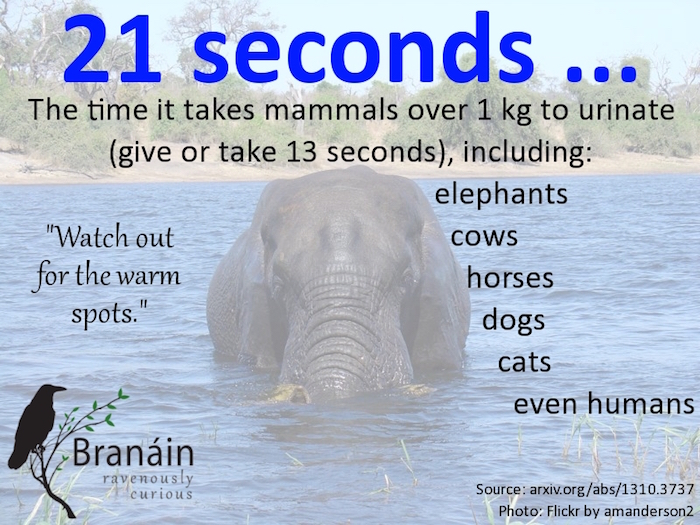It’s the moment we have all been waiting for.
Scientists have finally revealed the Law of Urination, a theory that rivals both Evolution and the Higgs boson as the scientific find of the decade … or millennia.
Developed by researchers at Georgia Tech, the Law of Urination basically states that it takes mammals 21 seconds to pee. Yes, that’s it, 21 seconds. A truly useful fact to tuck away in your brain for later, something you can think about while waiting in line to use the bathroom (“I could have urinated 100 times by now,” you whisper to yourself).
There are two caveats to the Law, however:
- This law applies to mammals over 1 kilogram (so none of those tiny mice that love to pee in your kitchen). Even with that restriction, however, the law encompasses everything from elephants, to farm animals, to household pets … to humans.
- Twenty-one seconds is the average time it takes mammals to relieve themselves. The actual amount varies by plus or minus 13 seconds, which means you could finish your business in as little as 8 seconds (which I don’t recommend because you will miss out on reading those interesting posters above the urinals).
The big question that comes up with this research (as with much research that doesn’t involve saving your life or improving your iPod) is obviously … WHY?
The researchers write in their study that knowing this tidbit might help veterinarians diagnose urinary problems in animals. The underlying science might also help engineers improve man-made systems such as water towers (from elephant pee to drinking water … all in 21 seconds). Either way, the researchers have some good material for their (hopeful) TED talk.
To learn more about the science of urine, check out a video posted by the researchers.
__________
References: Patricia J. Yang, Jonathan C. Pham, Jerome Choo, & David L. Hu (2013). Law of Urination: all mammals empty their bladders over the same duration eprint arXiv:1310.3737 arXiv: 1310.3737v2
Photo: Chobe River in a big elephants way swimming, Flickr by amanderson2



